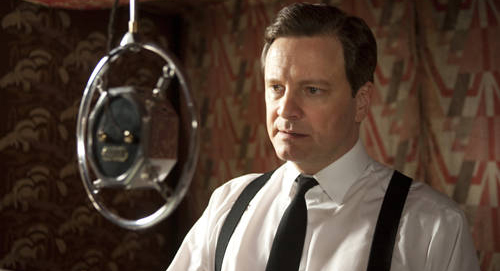The King's Speech
12A2011 was definitely a good year for The Kingís Speech. It didnít just go to the Oscars and win, it won big, taking Best Film, Best Screenplay, Best Director and Best Actor. Now thatís almost a full house in Oscar terms.
Now that the dust has settled, and with the filmís imminent release on DVD and Blu-ray, now is as good a time as any to ask the question: but is it actually any good?
In 1925, Prince Albert (Colin Firth) was given the responsibility of giving the closing speech to the British Empire Exhibition at Wembley Stadium. This wouldnít normally be that much of an ask for a member of the royal family, but Albert suffered from a severe stammer. It was a laboured affair and not only painful to give but also to listen to.
It was a problem that Albert was keen to rectify, but having already undergone a number of failed treatments, he had pretty much given up all hope. His wife Elizabeth (Helena Bonham Carter) however, was keen to persevere, and came across Lionel Logue (Geoffrey Rush), an Australian speech therapist.
After an initially frosty start, the pair soon began to embark on a friendship. However, itís soon severely tested with some right royal goings-on; not only does his father George V (Michael Gambon) take ill, the next in line to the throne Ė David, the Prince of Wales (Guy Pearce) Ė is besotted with American Divorcee Mrs Simpson and wants to marry her, despite the fact that as the future King heís not allowed to do so. On top of that, thereís also a small matter of a possible war with Germany.
With all these events unfolding, Albert Ė or Bertie to his friends Ė feels that now more than ever he needs to be able to speak with the kind of confidence that befits a Prince, for King and country.

Next up on Royal Radio we've got Prince with Purple Rain, followed by Queen and Bohemian Rha-rha-rha-rha- oh Flash.
British director Tom Hooper has had previous experience with historical dramas, which includes the US TV mini-series John Adams with Paul Giamatti, and the miniseries Elizabeth I with Helen Mirren and Jeremy irons. It shows too, with him not only getting great performances from all his cast Ė including those that didnít win Oscars Ė but also giving the film a visually stunning authenticity.
What may be open to debate is whether or not Firth truly deserved the Best Actor nod; itís a solid enough performance, but equally matched by Geoffrey Rush in particular. Itís their relationship that keeps the film ticking over. And although itís understandable that the Mrs Simpson sub story is essential to the plot, it does feel a little flat compared to everything else.
The film also suffers from being a little on the static side; despite Hooperís best efforts to make the film look regally appealing, there are still lots of head shots of people talking/stammering. It would make a great play of that thereís no doubt.
Still, David Seidlerís screenplay is written with great wit, warmth and style, helping to keep an audience focused and attentive for the majority of the time.
Itís Academy gold haul might not be entirely merited, but it shouldnít deter from the fact that this is a great little film. Itís one of those historical titles that us Brits do so well and should make one and all proud that it has been so well received around the world.
